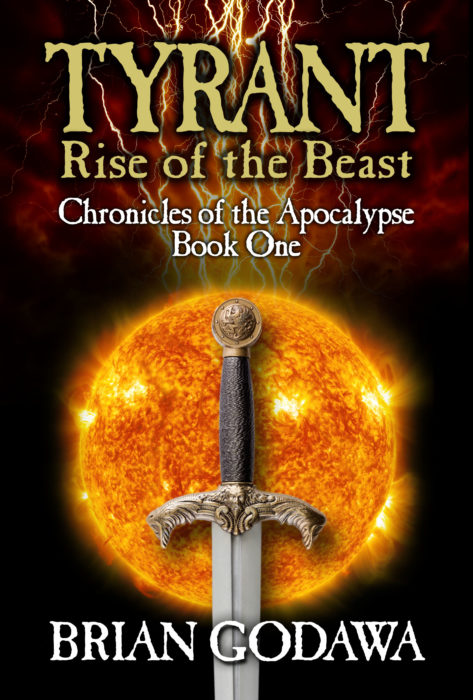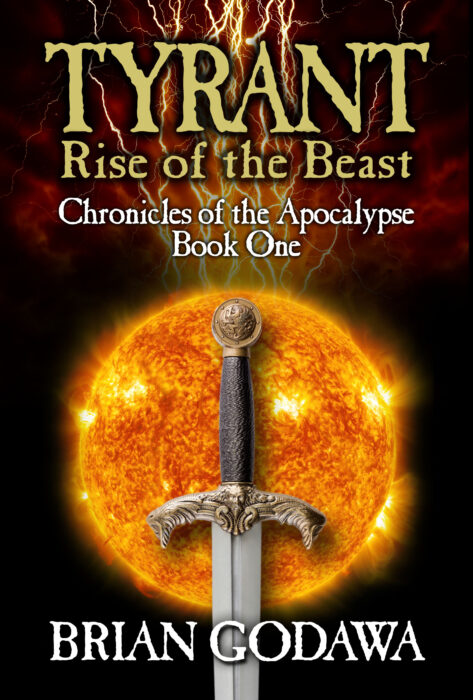Spiritual Warfare Novels, Fantasy, and the Bible
There have always been spiritual warfare stories about angels and demons fighting over the souls of human beings.
The most well-known Christian classic is of course The Screwtape Letters by C.S. Lewis. Though there is no shortage of modern novels about spiritual warfare, the Goodreads Top 50 list of popular books on the subject are dominated almost exclusively by non-fiction manuals on the subject—and then most of Frank Peretti’s fiction novels. Peretti is certainly one of the biggest influences on the fictional version of the genre for the modern era.
This week we feature Brian Godawa and his novel Tyrant: Rise of the Beast in Lorehaven Book Clubs. Stop by the flagship book club on Facebook to learn more about this story.
Subscribe to Lorehaven Magazine for free to download our new summer 2018 issue.
Many will remember his work for its satanic conspiracy and demons of every sin imaginable battling for control of humanity. There were exorcisms and deliverances, as well as prayer and fasting that overcame the enemy. And this represents one side of the issue that I would call the “personal” aspect of spiritual warfare: that is, dealing with evil spirits and their affect on or in our personal spiritual lives.
But is that all there is? Just a kind of dualistic struggle over saving and damning souls? I believe there is a bigger biblical picture of what is going on in the unseen realm. I call it the “principalities and powers” aspect of spiritual warfare. Satan, the “god of this world” (2 Cor. 4:4) has a master plan beyond dragging as many souls to hell as possible. The book of Revelation gives a peek behind the veil into that bigger picture.
Now war arose in heaven, Michael and his angels fighting against the dragon. And the dragon and his angels fought back, but he was defeated, and there was no longer any place for them in heaven. And the great dragon was thrown down, that ancient serpent, who is called the devil and Satan, the deceiver of the whole world—he was thrown down to the earth, and his angels were thrown down with him.
Revelation 12: 7–9
What is this war about? What is Satan’s strategic objective? And when does this happen? A common interpretation of this text concludes that this is “the fall of Satan,” that supposedly happened before the Garden of Eden temptation. But the context of this passage is not before Genesis 3, it is the Gospels, the incarnation of Christ (12:4-5). Satan’s throwing down to earth was a limitation of his power that occurred at the coming of the kingdom of God (Rev 12:10).

“Brian Godawa’s Tyrant unites history, spiritual warfare, and eschatology in an ambitious epic.” — Lorehaven Magazine
And when did the kingdom of God come? With the ministry of Jesus the Messiah (Matt 12:28). Jesus saw Satan fall like lightning from heaven (Luke 10:18) when he bound the god of this world in order to plunder his land and make it Messiah’s own (Matt 12:29). Satan lost his power to accuse Christians of their sin (Rev 12:10) because of the forgiveness achieved at the cross (Rom 8:1). That wasn’t an absolute binding. Satan can still walk about like a roaring lion seeking whom he can devour, but his power of death and sin over Christians has been taken away through Jesus’ death (Heb 2:14).
The New Testament spells out this spiritual victory through earthly suffering when it says, “Having disarmed principalities and powers, [Jesus] made a public spectacle of them, triumphing over them in it.” (Col. 2:15). There it is, that bigger picture phrase, “principalities and powers,” a phrase used by Paul to refer to the spiritual powers that ancient Jews believed were behind the earthly powers (Eph. 6:12). Satan is not the only angelic authority at war with God. Remember the angelic prince of Israel fighting the angelic “princes” of Persia and of Greece back in Daniel 10:12-13, 20-21? That’s the idea. There are principalities and powers over the Gentile nations, that ruled over them just like Yahweh is the owner of Israel (Deut. 32: 8–10).
The reference in Colossians to “triumphing over” is a military metaphor that was used by ancient Rome. Whenever Roman generals defeated someone in battle, they would drag their enemy leaders, dead or alive, through the streets of the eternal city to declare Caesar’s total victory over and humiliation of his foes. It was called the triumphal procession.
And that’s how Christ’s victory over the powers is portrayed.
I think you can see that the notion of spiritual warfare here is much more than fasting and praying to cast out demons in individuals. There is a territorial war going on, and Messiah is encroaching on the Gentile nations, owned by Satan’s fallen minions, to dispossess the false gods and take back the nations as his own inheritance. Some of the biblical blueprints of this angelic inheritance of lands is spelled out in Deuteronomy 32: 8-20 and Psalm 82. I don’t have the space to exegete those passages here (but I do that here).
But a brief outline of Psalm 82 is this: Yahweh has a heavenly court of divine beings called “gods” (verse 1). Yahweh gave those angelic “gods” the duty to rule with justice over the nations as their inheritance, but they were wicked and did not obey (verses 2–5). So God renders judgment upon those immortal princes for their wickedness by condemning them to death like human princes (verse 6–7). This judgment is linked to the resurrection of Messiah who will dispossess those false “gods” from their lands and inherit the nations in their place.
Whoa. What would that spiritual war of inheritance look like? We know the theological conclusion from Colossians and Revelation. But how does it play out in the heavenly realm? If we were to have the veil pulled back and our eyes opened, like Elisha’s servant, what would we see? (2 Kings 6: 17–20)
I do just that in my best-selling biblical fiction series Chronicles of the Apocalypse. It’s the origin story of the book of Revelation. The first book is Tyrant: Rise of the Beast. I tell the tale of the apostle John, Romans, Christians and Jews in the first century during the tyrannical reign of Nero as the Jewish War brought the armies of Rome down upon Israel. It’s the milieu in which John saw his visions and wrote them down. But I also pull back the veil of the unseen realm and depict what the spiritual war between the dragon and Michael might look like. I put the apocalypse in its historical context, and try to capture how the ancient Jews and Christians understood its spiritual war in their own day.
Trigger warning: This ain’t your mother’s Left Behind.
“Brian Godawa’s Tyrant unites history, spiritual warfare, and eschatology in an ambitious epic.”
— Lorehaven MagazineExplore Brian Godawa’s novel Tyrant in the Lorehaven Library.
Read our full review exclusively from the summer 2018 issue of Lorehaven Magazine!




























Novelist Brian Godawa asks: “Spiritual warfare in the book of Revelation—what does it really look like?”
I dunno, man, it looks like symbolism to me.
Brian Godawa in his book Tyrant has the best presentation ever of the “Angelic Conflict” as described in the Bible. (I personally imagine this angelic conflict to be the original “star wars” — the war involving the creatures inhabiting the rest of the universe as well as earth.) Even if you don’t believe in the Bible or have a different eschatology (Brian’s is called “preterism”), Tyrant is a great story which I recommend wholeheartedly. I liked it — I liked it very much. There are a lot of good storytellers writing good novels — I regard Brian Godawa to be the best.
Well, I think the territorial concept of demonic powers owning certain pieces of terrain is not really Biblical–Psalm 24:1-3, the Earth is the Lord’s. Not just after the death of Christ, but long before it, God owned every stitch of every bit of creation–the only things that defy the will of God are those beings he endowed with will, human and demonic, who were and are in rebellion to him. (And of course a Calvinist would even argue God willed they resist his will…)
It is true that there are evil spiritual powers here on Earth–which would be assigned to people, not places. The “Prince of Persia” was in charge of the people who lived there–not to pieces of geography, with rocks, hills, and trees. I’d say rather that the waves clap their hands for God in the Psalms, the mountains smoke at this presence, the rocks would cry out if human beings would not in Jesus’ words–in other words, creation is fully subjected to God, except for evil spiritual beings, often called demons but which are also the origin of Pagan concepts of gods. Oh, and also except for humans.
The contrast between these ideas is pretty strong, I think. The ancient Pagans believed there really were holy places on Planet Earth, and holy items. And unholy items.
The Ark of the Covenant is sometimes treated by people as an equivalent holy relic…but it wasn’t really. And the temple mount in Jerusalem a site of holy power–but no, God controlled and controls everything and could be prayed to from anywhere (please reference the book of Jonah). And the Bible is completely lacking in holy or unholy sites other than that–Elijah came out of the same kind of wilderness that some people claim the scapegoat went to in order to appease a demon. Michael Heiser claims the transfiguration happened on Mount Herman because it was a gateway to the underworld in Canaanite mythology–yet it actually was just the highest mountain around, isolated from the prying eyes of all but the select few. Oh and effortlessly under the complete control of God. Jesus fought no spiritual battle there that the Bible records–and he didn’t have to. He already owned it.
The battle is over the hearts and minds of human beings–and the demons are active in defending what is theirs. But the ideas of Watchers and so forth that Heiser and other insert into the text of the Bible from extra-Biblical sources is really just very ancient fiction.
Interesting fiction, to be sure, but fiction.
So I can easily imagine that this work of fiction by Brian Godawa is really interesting, too. And there’s nothing wrong with enjoying interesting fiction. But I felt I had to at least mention that the worldview espoused in the story as presented in this article is at the very least one that a person could object to for very real Biblical reasons–as I’ve just done. (That’s putting the situation mildly, by the way.)